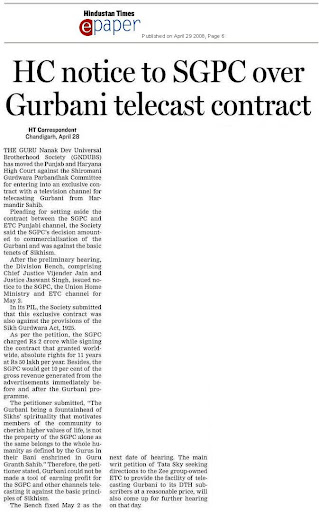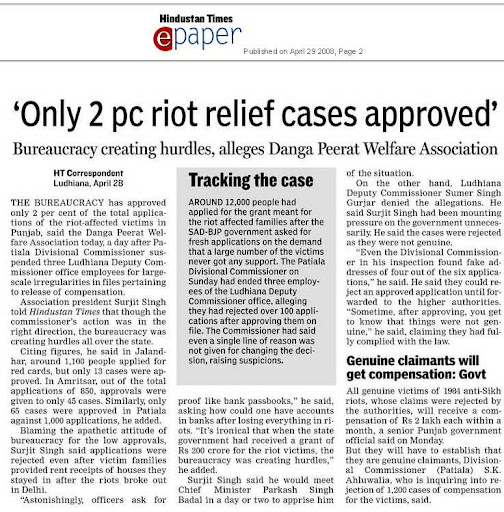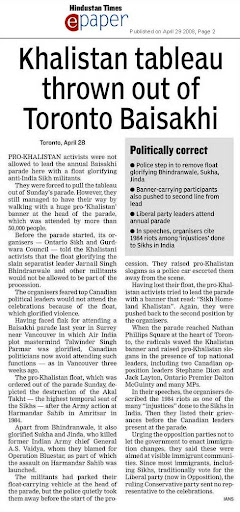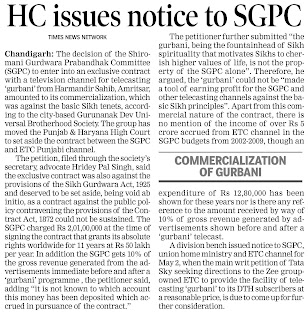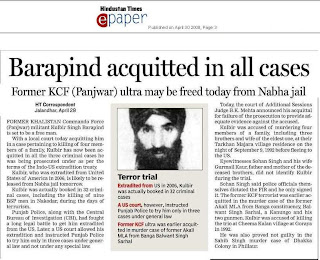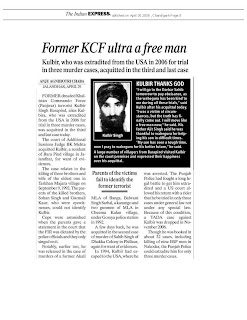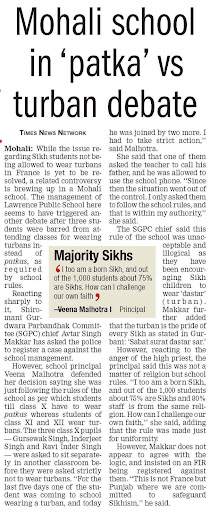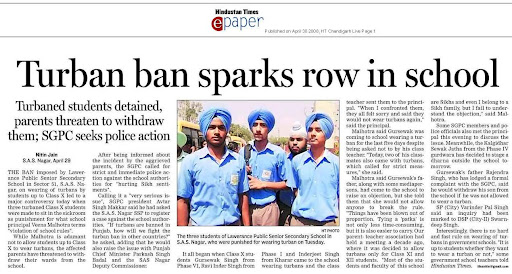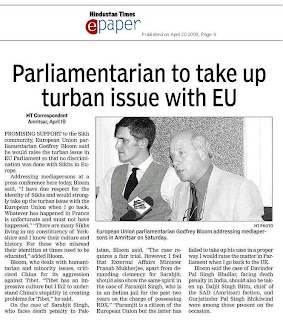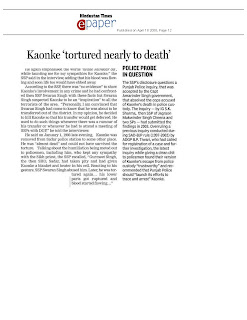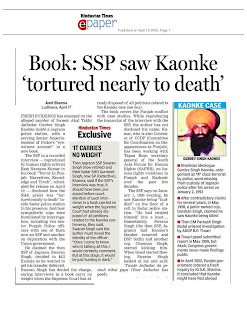http://news.bbc.co.uk/onthisday/hi/witness/october/31/newsid_3961000/3961851.stm
1984: Assassination and revengeAt 9:20am on 31 October 1984 India's prime minister Indira Gandhi was shot by two of her security guards in the garden of her home at No 1, Safdarjung Road in Delhi.
The attack led to rioting on a grand scale across India as Hindus took their revenge on Sikhs. At least 1,000 people are thought to have died and the army eventually intervened to quell the violence.
The assassination itself was revenge for the raid on Sikhism's holiest shrine in Amritsar to flush out separatist militants who had taken refuge there.
Your memories of Indira Gandhi:
I was in 4th grade and in Chennai (then Madras).
I still remember the shock that passed through the city learning the news. Panic spread like wild fire and the city shut down fearing riots.
My mother came and picked me up when the school closed.
All the way home, I remember seeing police jeeps cruising trying to keep control.
Later on, I remember, a lot of India grieved her like they would grieve a family member's loss.
Lavanya Ramanujan, India
I was about 13 years old when this happened. So many years have passed but but the pain remains - for what happened to the Sikh community, for the failure of our democracy to protect the vulnerable and for the failure of our justice system to bring to book the perpetrators of the crimes against the innocent.
Indira Gandhi's death was a loss for the nation, but nothing as compared to the loss of confidence each citizen of this country suffered in the very existence of this nation and its sustainability.
We as a nation really failed to protect our own citizens and the principles we claim to propound.
I, as a citizen of India, and having lived in the Punjab for a larger part of my life, salute the diehard and brotherly spirit of the Sikhs and apologise for the failures of our people.
Today the Sikh community, given their brave spirit, has moved on with life, but for many, the loss was too much to bear.
We lost such individuals to the arms of antinational forces or to other nations where they migrated to.
For all the hype that India gets in the international media, we must remember that we have many black chapters in our history.
Gujarat was a repeat of 1984 and we as a nation continue to fail on most crucial matters.
So much for a Security Council seat and the superpower status when our own house is on fire.
Albert Savio, India
My whole body starts trembling whenever I recall those days. It was the 1st of November, 1984 the day after the Prime Minister of India Indira Gandhi was brutally killed by four Sikh ¿extremist¿ who were her bodyguards too.
We were having evening tea in our house situated in a rural area of Delhi called Narela. Suddenly somebody knocked at the door. My father went to see who it was and found that it was his friend Abbas Ali who had come to inform us that a cluster of around 200 "fanatics" was marching towards our house and they had already set fire to and looted two Sikh houses in our locality and were on the way to our house.
My brother and I were forced to dress up like girls and had to tie up our hairs as girls do, just to hide our identity as Sikh children
Inderbir Singh Duggal, India
We had very little time to react, we decided to lock the house, and went to one of our neighbor's house to hide us.
As a six-year-old child, I could not understand what was going on and why.
My father and my uncle had to cut their hair so that nobody could identify them as Sikh. My brother and I were forced to dress up like girls and had to tie up our hairs as girls do, just to hide our identity as Sikh children.
After half an hour, we heard that our house had been looted and it was on fire. None of us could sleep that night.
The next day all of us went to see our house and the only thing we saw were ashes all around - nothing was left.
The atmosphere was still very hot in the city and we were not secure.
At around 10:30 in the morning on the 2nd of November, a police van came and they took us to the police station and from there we were shifted to a riot victim camp.
There we met so many of our relatives who had also lost everything. In fact, some of them had lost their loved ones too.
We stayed in the camp for around a week and when the atmosphere in the city became calm, we were shifted to our localities.
We stayed at our neighbor's house for around a month. Everybody from our colony used to invite us for breakfast, lunch or dinner and a month passed like that.
Since my father and my uncle were both in government service, they got government accommodation on riot victim grounds and we shifted to Timarpur, a state government colony. But those who were not in government services had to renovate their houses.
Can anyone imagine the amount of compensation we got from the government? It was Rs. 5000!
Now after 20 years, we have again managed to get our own house in Delhi, but still I cannot feel secure because incidents like the '84 riots are very common in India.
That time it was the Sikh community which was the target and recently something very similar, or I should say something worse than, the '84 riots happened with Muslims in Gujarat.
For me, the major causes behind these communal riots are poverty, jealousy (it is clear that the attacks on the Sikhs had less to do with love for Indira Gandhi and more to do with resentment against them because they were a well-to-do community in Delhi), and the lack of independent thinking, which allows politicians to manipulate religion and fool people into thinking that killing other people serves their religion.
What the '84 riots taught me is my own precarious position in the Indian nation but also the shallowness of identity and politics in the subcontinent and in human nature.
Inderbir Singh Duggal, India
I remember that day clearly. I was just under 5 years old.
My mother broke the news to me as she came to pick me from school at about 5pm.
I asked her in shock why she had been shot.
She had a hard time answering me.
I remember the shock that gripped the nation. I remember the mourning.
Praveen, India
And I remember that not many people knew Indira Gandhi was dead. State-controlled media, as for as I remember, had not yet broken the news!
All we had where I lived in South India was one state-run channel. My father had tuned in BBC radio following the news intently.
I remember the shock that gripped the nation. I remember the mourning.
For up to a week later there were no programmes on TV including my own favorite children's programme.
And at that age I knew some terrible things were happening in Punjab which I did not understand until much later.
Looking back at those days it makes me think how quickly time passes. How much has changed. Globalization, the age of Internet and instant news. We are no longer bound by state controlled media.
And yet in some ways how little has changed. It is disgusting that nobody has even properly apologised for the Sikh families who were murdered.
And the same political petty mindedness that was displayed then is still being displayed today.
It seems we have learned very little from the past. But those terrible events are to a large extent behind us. And in spite of some reservations about our politicians I look towards the future with hope.
Praveen, India
My Sikh mother's extended family, consisting of seven members living in Delhi at the time, were shocked by news of the death of Indira Gandhi.
The event just never seemed a possibility. They, and many others like us, were entirely apathetic to the burgeoning political Khalistan cause in neighbouring Punjab.
That all changed in the following days when their Hindu neighbours - acquaintances that they had known for years - turned on them and broke into their small dwelling with blood-soaked machetes.
My friend's dad, a street grocer, was fatally shot in the face whilst tending his stall.
Thousands of innocent Sikhs like them were massacred in the hysteria that swept Delhi for days.
The police and army were guilty bystanders during the witchhunt of any man, woman or child belonging to the Sikh faith.
And to this day, the overwhelming majority of the perpretators have not been brought to justice. The scars have not healed.
Gurinder Singh, USA
I was 10 years old at the time, living in Calcutta, India.
If it makes any difference to even one Sikh person or family, I want them to know that I am really sorry this happened to their community
Sanjay, USA
I remember being very upset that Indira Gandhi, or India Gandhi as she was fondly called, was murdered by her own body guards.
I saw many Sikhs being beaten and killed by angry mobs.
I recall my punjabi non-Sikh neighbor's car being smashed and burned.
I remember having Punjabi guests in our home at that time whose son was not to be found and his parents were inconsolable.
He later returned home after hiding in a cinema hall basement for two days.
I also remember that for years I believed that what had happened to the Sikh community was right and that the mobs were justified in making the Sikhs pay for their betrayal.
Now, as a more mature and sombre adult, I regret having thought and believed that way, but even more so I regret that no Indian government actually ever formally apologised to the Sikh community.
Even now, after two decades, I would occasionally meet a Sikh person who would recount how a loved one was killed and the surrounding family was devastated and their lives were never the same.
If it makes any difference to even one Sikh person or family, I want them to know that I am really sorry this happened to their community, and if it is any consolation for the heinous crimes committed against them, many Indians feel the same way.
Sanjay, USA
Oct 31st 1984 - I was 13 years old and in school (9.00am).
We were told that we are to go back home.
As a student, a day off from school was great.
We did not even think of the consequences of the events happening around us.
The next 10 days were the most horrifying in my history.
Sikhs being burnt alive. My father and I were trying to go to the airport, on the way we saw an oil tanker tipped over, and being set fire. The driver was a Sikh and he was burning too.
Never should any community in the world be subject to such atrocities.
Harihar, USA
I was in my third standard when this happened.
Around 10:00 am that day the school was closed for the day.
As we were walking back to our school bus, we walked past the staff room. I saw my teachers in tears, hugging each other, have a kind of tragic look on their faces.
Soon there was a rumour that our school principal passed away.
Later in the bus, one of the teachers announced that Indira Gandhi has been shot, and she was in hospital and asked us all to pray for her recovery.
By the time I reached home, there were a considerable number of people at my home, as we were the only people to own a TV in the neighbourhood.
One of my uncles was so optimistic [saying] that in some war a general was shot 30 times and saved by the doctors, and he said, "She is the prime minister and she has only 16 bullets, she will be alive."
I always wished if it was true. My family mourned as if it was death of a family member.
To this day, she is the Mother of two generations. Indira is India.
Raju, India
I was unfortunate to witness the carnage the Hindu mobs had inflicted on the Sikhs and their property.
I was approached by a militant Hindu BajRang Dal activist who urged me to attack and kill Sikhs.
I declined with shock. It reminded me of stories of Jews and Nazi germany. I fear this event has began the process of disintegration of my country India.
Many Sikhs who were once loyal citizens are now ardent seperatists for a independant Khalistan.
Ramesh Patel, India
I was a teenager at the time of Indira's assasination.
That noon I was scheduled to take my ailing grandmother by train for radiotherapy in Delhi.
Fortunately, the news came before we could leave and possibly saved our lives.
The neighbours turned on their neighbours and the Indian civilisation broke down in two separate societies
Arvind Singh, USA
This cerfew was only limited to the Sikhs as the mobs were free to roam around the city and raise slogans - Blood for Blood!
Our Hindu neighbours brought food and supplies for the next five days while we were confined to our homes by police cerfew.
Not all neighbours were as good as ours. In most places, the neighbours turned on their neighbours and the Indian civilisation broke down in two separate societies.
I no longer considered myself Indian and subsequently left India forever. The Sikhs will remember the massacre forever and we will make our best efforts to show the TRUTH to the world.
Shame to India, Gandhi family and the Congress Party that indulged in merciless killing of innocent people.
Arvind Singh, USA
I was 7 years old when the ghastly incidents unfolded in the summer and fall of 1984.
At that age I wasn't quite sure what was going on but I have been told many stories by my parents who protected me and my brother from murderous mobs in Delhi. We were fortunate enough to have lived in a relatively affluent part of South Delhi at that time and could take refuge during the worst of the riots at our Hindu friend's home.
I do remember one thing though - a red X on our house indicating that our house was inhabited by Sikhs, shameful for a "civilized", "secular" and "democratic" nation.
K Bains, Canada
I was 12 years old. It was the day of our annual performance benefit for our school held at the Music Academy of Madras.
We were at the Academy early that day, doing a full dress rehearsal when someone first said the president of India was shot dead. Soon the news was rectified and we found out that it was the prime minister. There was palpable fear and tension in the air.
We were shipped back to the school, and our parents were expected to come pick us up. We heard of gangs of men roaming the streets demanding all shops be closed and generally causing unrest.
It was late afternoon when my father showed up, a civil servant, on a borrowed bicycle from his peon.
I saw en route great many groups of men, as they had told us earlier, roaming the streets. I saw one man with a huge sword, yes, a sword. Not a machete, of which there were many, and many cricket bats and other assorted weapons, real and improvised.
It was a miracle to reach home safely. My mother and my younger brother had walked home, by then and were waiting for us anxiously.
We found out later there was much violence, in particular against Sikhs, and much of it was concentrated near the area of my school.
I was very troubled and anguished - both for Mrs Gandhi, who we heard was taken to the hospital in the bloody arms of her daughter-in-law, Mrs Sonia Gandhi - as well as the victims of violence of that day, and the many following days.
It is a shame, that we can not as a human society find our way past revenge and retribution.
Vennila nr Kain, USA
I was in Patna, Bihar. My mother was ending two days of fasting for the Chatt festival in the state of Bihar. Our family had gone to the ghats of the Ganges, where my mother offered prayers to the Sun God.
It was an auspicious day for everybody in Bihar. After the exchange of greetings and blessings from elders the children of the household settled down in front of the television.
Suddenly the regular programming was interuppted and newscaster Salma Sultan broke the news that Mrs Gandhi was attacked by gunmen this morning and that she is undergoing an emergency operation.
The mood in the house turned from joy to shock in a second. A minute later the phone rang and my uncle on the other side asked my father if he heard the news.
Soon the word spread and people collected in groups talking about what is next after Mrs Gandhi, who is responsible, is there a bigger plot etc.
The evening news bought the offical confirmation of her assassination.
The organised roiting and killing of Sikhs that followed was shameful.
Mukul, USA
I was 12 years old when when the attack on the Golden Temple occurred and innocent citizens were killed.
The feelings and pain of being violated are still raw. The death of Mrs Gandhi is sad because death is sad but I must say that it was expected.
As Sikhs we saw her no different than many in American see Osama bin Laden.
Varinder Singh Rathore, USA
The one who would have killed Hitler would have been a hero, The one who would have killed Saddam would have been a hero. The ones who killed Indira Gandhi is and still are heroes.
It's amusing how the Mr Mehrotra in the news article talks about democracy when the same regime barred the human rights activists and journalists from entering Punjab, when Indira Gandhi was committing the worst massacre of Sikhs in Punjab.
Not only this, the party workers of same party were butchering Sikhs in Delhi.
It really perturbs that the Sikhs who gave 85% for freedom struggle for a country that never existed before (India which is a creation of British Empire) were and are still being tortured by the same country and Indira Gandhi's role is not unfolded by the media.
Harmeet Singh, Punjab
I was in school, when someone floated a rumour that Indira Gandhi had been shot.
Later our principal told us to take a half day and go straight home. We got the confirmed news in the evening. We couldn't believe that it could have actually happened - it was like a cruel joke had been played on India.
The most eerie and dastardly aspect was that the deed had been perpetrated by those who had sworn to protect her.
Everyone was sobbing - it was a horrendous day.
Madhu, India
I was 12 years old and was in school when this news broke. Everybody in our house was sad and we were angry that her own bodyguards had done this to her.
Then the riots broke out and I felt ashamed to be an Indian. Innocent men women and children of a brave and sacrificing community were killed on the streets of Delhi for no fault of theirs.
This is something I will never forget. Once I grew up and learnt more about the woman, I realised that she ended up reaping what she sowed.
For me Beant and Satwant Singh are heroes who freed the country from the evil clutches of the Gandhi mafia.
Annie Singh, USA
I was studying in first standard in a government lower primary school then.
One teacher, called Mohammed came to our class to announce this news. He was a strong person in our calculations, but he was shivering.
The school remained closed for a week. At that time we too hated Sikhs but we never heard the news of mass carnage which took place in the capital of India as a revenge to the prime minister's death.
Most of our media concealed the truth, and I was not in an age to understand the seriousness of those killings.
Now after two decades the picture is clear to me. I am a journalist now and trying to tell the world we were wrong. We are guilty.
Savad Rahman, India
I remember watching news coverage of the rioting that [followed] the assassination of Indira Gandhi.
I saw a Sikh woman running with her son (10-12yrs old) towards the line of army personnel. The Hindu mob chasing them caught them not more than 20 yards from the army line.
They put burning necklaces of tyres onto the unfortunate pair and burned them alive. The army stood and watched.
Those harrowing scenes will remain with me for the rest of my life.
Rahul
I was seven years old when this event happened, and I can never forget what I went through that day.
I was enjoying a week long holiday with my mum, dad and sister in Kashmir and we had only just arrived the previous day when this incident happened, and then there was chaos everywhere.
We had trouble even getting out of our hotel, let alone going to the airport to catch a plane to go back to Mumbai.
We were listening to the news on the radio and found out that some people were celebrating the death of Indira Gandhi by bursting crackers, distributing sweets and hoisting Pakistan's flag in Kashmir.
Finally we somehow managed to catch a flight back and realised the enormity of the situation when we watched the news on TV.
I can never forget that day. I admired Indiraji for her courage and strength, her death was a great loss to India. May her soul rest in peace.
Shraddha Kane, UK
I was 14 years old and remember the day like it was yesterday.
We were in school and were sent home. Even though we were sikhs, we never supported any claims for Khalistan or Punjab, growing up in the capital since birth - we never thought in religious terms, we were also shocked and saddenned to hear about Mrs Gandhis death. She was a very instrumental politician.
We were home the next morning and went to the roof of our house. The sun could not be seen there was smoke everywhere. The stench of death and fire was in the air.
Suddenly we heard a loud roar and ran back inside.
Iit was a mob being led by a local congress leader with a list of electoral documents in his hand to exactly pinpoint where Sikhs were residing.
We hid in the house and later learnt that this mob had just set fire to various residences in our very posh Delhi neighbourhood and had just burnt down the local Sikh gurudwara.
The mob collected outside our house. I peeked from the second floor window and saw a group of about 50 people standing outside our gates with various weapons, while one person was going through some papers scanning them quickly.
Our relatives that lived on the first floor ran up also to join us and we all huddled in fear.
It seemed like the end was here and it would only be moments before the mob would break through the gates and set upon us.
And then I heard a voice, it was as if GOD had sent an angel to disperse the crowd. It was our next door Hindu neighbour and I remember him in a very firm yet authoratative tone talking to the mob.
He said all the people that live here are our own people.
Then for what seemed like an eternity the mob chanted some slogans and started to move on. We could hardly believe our luck. The will of GOD had saved us and this old neighbour with his commanding presence had talked the crowd to move on with a few simple words.
Those emotional scars have caused me to leave India at the age of 19 And I have not visited or gone back for almost 15 years.
It has turned me into a cynic who will not even visit India because of that one incident.
Bobby Singh, USA
I was four years old. My sister, cousin, brother, mother and me were walking back home in the afternoon from the school bus stop, when we heard someone yelling that Indira Gandhi had been killed.
Once we reached home we all sat around the radio, listening to the story in shock.
My next memories are of my uncle and the other men in our colony forming huge groups and patrolling the neighbourhood throughout the night armed with knifes, sticks etc. to protect the Sikh neighbours in our colony.
All Sikhs were given shelter in neighbours houses. The name plates in front of the houses were removed.
The young Sikh boys were dressed as girls, while others cut their hair.
There was so much tension in the air.
Anusha K Schneider, India
On 31 October 1984 I was due to fly to Calcutta on an SAS flight via Copenhagen from Gatwick. I was travelling with my father.
The weather was terrible in Gatwick and the airport was totally fog bound. My father and I watched as the "CANCELLED" sign flashed up on the departure board for practically every flight.
Our flight was one of the few for which there was no information. Long after the boarding time for the flight had come and gone our names were announced on the tannoy.
My mother, who had come to see us off, was still in the airport and suggested, very calmly, that we leave the departure lounge and forget about boarding.
We did so, thinking her concern must have been weather related. Only in the long car journey back to North Yorkshire, when we switched on the radio, did I realise the wisdom of her advice.
"After the assasination of Indira Gandhi..." came the presenter's voice. Even at my age I knew that spelt bloodshed.
Our flight might have been held in Karachi for hours and several travellers were thrown into the melée when they arrived in India that night.
Instead, I got home and went to bed. The next day was my 11th birthday.
Ms Sarma, UK
I am 32 years old now, I was about 12 years or so at the time.
You know it has been twenty years, twenty years! I cannot imagine. As I remember our first house in India was being built around that time, and we did not have TV in our home, so we watched the death ceremony in our neighour's house.
I remember the mourning of general public on TV and I vividly remember our greatest TV star Amitabh Bachhan crying for Indira Ghandhi.
I don't know how a person can be so attached to the prime minister of his/her country.
We watched the whole ceremony on the TV just like a soap opera. And we enjoyed our off days at school for 13 days. What can a 12 year boy can think of?
And I remember about the riots that happened in our small city. Bareilly, this is a city in north of India in the state of Uttar Pradesh.
Usually Bareilly is a peace loving city, but I remember one incident. One of the friends of my eldest brother was a Sikh, and he had to cut off all his hair so that Hindus did not think him as a Sikh, and did not harm him.
And yeah there was curfew also in our small Mohalla (like a county in US) Subhash Nagar.
And I remember one more thing after the death, my another elder bought a book about Indira, with pictures of her.
I remember two pictures one Indira Ghandhi standing along the border (I don't remember which one Pakistan or China), and one Indira Ghandhi eating roasted corn.
Saharsh Shroteiya, USA
It was a sad demise of Mother Indira who was a role mother and an iron lady of India which is my second home.
Her good works would never go in vain. She was an example in every respect. I love her and shall ever have a respectful position in my heart.
I would like to salute her from the hight of Mount Everest for being Indira. I don't think anybody would be able to take her position.
Khem, Nepal
I still remember vividly the day Mrs Gandhi was killed by her sikh bodyguard; I was Just 11 years old at the time and hardly understood world politics and happennings around the world.
We were crazy about playing cricket those days and we used watch telecast on TV and the state owned Doordarshan in those days.
On that day India playing was test cricket with some country, and suddenly the match was suspended, that's what all I remember.
I have preserved the English newspaper which flashed the news of this shocking and unfortunate incident. I remember the banner headline of a tabloid newspaper, which said: "stop this madness," quoting Mr Rajiv Gandhi.
Indian politics was never the same again. We had a rough and tumultous time afterwards. Hundreds of innocent Sikhs lost their lives and the scars are still fresh for many of them.
Mrs Gandhi was successful in defeating Sikh militancy who demanded a separate Sikh land called Khalistan.
But the repercussions were dangerous and she was eventually assassinated in a very inhuman and dastardly fashion. Henceforward India was never the same again.
Nawal Thorat, India
I was 12 year old at the time and remember how happy we were to get a day off from the school.
My father being a staff of the Ministry of Defence thought that it would be safe enough to do some shopping in evening.
As we were riding on scooter to the market we were stopped by some angels (Hindus of course) telling us not to proceed any further.
My father was confused as to why would any one attack a Sikh and his child particularly when he was in the army.
He did however take their advice and we returned. The next few days were the scariest days of my life.
Thousands of Sikhs were reported killed, innocent girls raped by crowds. Police stood watching... We survived due to our helpful and kind hearted South Indian neighbours but the scars will remain for the rest of my life.
Ranveer Singh, Hong Kong
I have vivid memories of this day working as trainee doctor at Rajendra Prasad Centre which was the Eye Unit of the All India Institute of Medical Sciences where Mrs Gandhi was taken for further treatment.
It was a Wednesday mid-morning when I suddenly noticed the out patient department, which is normally full of people was empty, and when I managed to look out of the clinic, I could see a sea of humanity in the main quadangle in front of private wards.
By then, even before the BBC annouced her death, rumours had gone around and her Sikh body guards were implicated. This set off mini riots in the hospital and President Zail Singh's car was attacked and the Indian President had to be whisked away through the back door.
By evening when I was doing the ward rounds the anti-Sikh riots were in full swing and ordinary Sikh man was chased down the corridors of the hospital by an angry mob in an attempt to attack him.
I did manage to save this man's life by giving him an eye patch asking him to occupy one the empty beds in the hospital and requested him to pretend to be one of the patients. The angry mob eventually left the hospital without succeding to get their victim.
Meanwhile Mrs Gandhi had also donated her eyes for corneal grafting and unfortunately in the political storm the eyes could not retrieved in time. It would have been a great advertisement for eye donation in India and I still think was a missed opportunity.
Dr Raghu Ram, UK
I was out playing with my friends when my grandmother told me that we are going to a friends' place to watch Indira Gandhi's funeral on colour TV. We had a black and white television and I'd never seen a colour TV, so I agreed. That's when I found out she was our prime minister. My mum, then pointed out, "Remember the Operation Bluestar incident?" [the storming of the Sikh Golden Temple at Amritsar by the Indian Army] "Some say she got killed cause of that".
Our family was heading for Jammu and Kashmir then (on day of operation blue star) and our train had a routine stop in Amritsar (in Punjab), but it stayed there longer than expected. We got down and refreshed ourselves with a cup of coffee when my mom came running towards me and said we have to abandon this train and take another one that was arriving shortly and moving away from Punjab.
We boarded the other train in a matter of minutes with many people hanging to the door. Our parents threw us in and my dad got in when the train was still in motion. As we exited the station, we saw men running around with lit torches. That's all I could remember. I later learnt that people were reacting to the Operation Bluestar incident.
My mom described Indira as "a lady who tried to make a difference to the citizens of Mother India". Some of my friends (sikh) friends believed that she was being punished for the Operation Bluestar incident, in which she played an instrumental role.
We still have a picture of Rajiv and Indira Gandhi hanging from our walls to this day. We deck them with flowers, a custom for bestowing respect to the ones that have crossed over (dead).
Prakash Krishnamoorthy, USA
